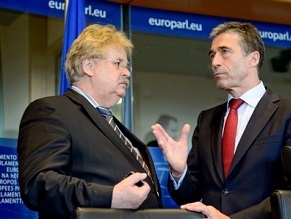|
World Jewish News

NATO Secretary-General Anders Fogh Rasmussen (R) with Elmar Brok, chairman of the the European Parliament’s defence and foreign affairs committees.
|
NATO’s Rasmussen to MEPs: ‘We haven’t coordinated any strike’ with Israel on Syria
08.05.2013, Israel and the World NATO Secretary-General Anders Fogh Rasmussen sought to extricate his organisation from accusations of complicity in Israel’s reported air assault on Syria Monday, at a joint debate on the future of European defence cooperation with NATO with the European Parliament’s defence and foreign affairs committees.
Evading questioning from MEPs including Spanish Christian Democrat Jose Ignacio Salafranca Sanchez-Neyra on the likely impact of Israeli incursions into the Syrian crisis on its neighbouring countries such as Turkey, Rasmussen responded that “no such activity has taken place in areas of relevance for our deployment of patriot missiles in Turkey”, as he emphasised the case for political solution over military intervention to end the two year-long crisis.
The issue inevitably occupied due focus during the course of the debate, as questioning regarding NATO’s so far refusal to engage in the escalating crisis became more pointed. Belgian Socialist Member of the European Parliament, Veronique De Keyser, a fierce Israel critic, accused NATO of being “complicit in the bombings carried out by Israel on Damascus”, as she invoked the alliance’s March cooperation agreement with the Jewish State, which she concluded marked the admission of Israel as “a de facto member of NATO”.
Demanding clarification of the Secretary-General on the closed-door cooperation between NATO and its Israeli allies, she continued: “The idea was to strengthen the process of military plumbing between NATO and Israel for the purposes of any actions in the Middle East. That was just two months before the current operation and it’s hard to believe that there’s been no coordination.”
“No, definitely not,” came the unwavering response from Rasmussen, as he insisted that the agreement with Israel served as part of a wider cooperation between NATO and six other countries in North Africa and the Middle East, as he concluded by emphasising: “We haven’t coordinated any strike.”
Appearing to absolve NATO of responsibility for the ongoing crisis, amid the continuing inefficacy of coordinated international efforts to implement a political solution to displace Bashar al Assad’s authoritarian regime from power, Rasmussen conceded he remained “concerned” about the humanitarian situation, the risk of spillover to neighbouring countries in the region and the possible use of chemical weapons, nevertheless concluding that a political solution was the responsibility of the international community and “would take agreement among the five permanent members of the Un Security Council...(and) a strong and unified message from the international community”.
This response infuriating certain members of the chamber, prompting Dutch Liberal Democrat Marietje Schaake to question why “on a number of occasions, even without being prompted, you mentioned that NATO would not get involved in Syria”.
Conceding it was a common line of question, in light of NATO’s successful operation in Libya to displace former authoritarian leader Muamar Ghaddafi, “why couldn’t you do the same with Syria”, Rasmussen echoed EU foreign policy chief Catherine Ashton’s line of argument with the chamber in a debate on Syria last September, when she told MEPs “Syria is not Libya and you shouldn’t mix them up”, the NATO leader insisted that “there’s a very clear difference between Libya and Syria”.
“In Libya, we operated on the basis of a very clear UN mandate to protect the civilian population from attack. And we got active support from countries in the region. None of these conditions are fulfilled in Syria. Syria is a much more complex society and I do believe that an external military intervention might have unpredictable regional repercussions. This is the reason why I do believe that the right way forward is a political solution,” he extrapolated, as he admitted to “sharing your frustration”.
Describing developing events in Syria as “outrageous”, he regretted that the UN Security Council has to date “failed to reach a consensus”, as he insisted it already had a necessary political framework to put into use.
“As you will recall, in June 2012, the so-called Action Group on Syria issued a statement, a declaration signed by all five permanent members of the UNSC. In that statement, it’s clearly stated that the regime in Damascus should initiate a process, a transition, leading to an accommodation of the legitimate democratic aspirations of the Syrian people. I do believe that a political solution could be based on that declaration,” he concluded.
Elsewhere in the debate, Rasmussen evaded questioning from Bulgarian Social Democrat Evgeny Kirilov on the issue of the EU’s protracted response to the Bulgarian enquiry into last July’s terrorist attack on Israeli tourists in the town of Burgas, which concluded that Hezbollah operatives were culpable for the incident. Evoking the “controversy” provoked by the US and Israel’s continued insistence that Hezbollah was indeed behind the attack and calls on the EU and “their allies to deal with Hezbollah in an official capacity”, Kirilov questioned whether Israel’s reported incursion into Syria, itself accused of using Iran made chemical weapons, “is possibly related to the fact that if something serious has to be undertaken in the future regarding Iran, Hezbollah probably has to be dealt with first”.
Ashton’s only official response so far to the Burgas findings expressed “the need for a reflection over the outcome of the investigation”, with her spokesman further conceding that outlawing the group was merely one of “several options” the EU had to consider. The EU’s counterterrorism coordinator Gilles de Kerchove has further claimed that committing a terrorist attack was “not the only legal requirement that you have to take into consideration, it’s also a political assessment of the context and the timing”.
by: Shari Ryness
EJP
|
|
